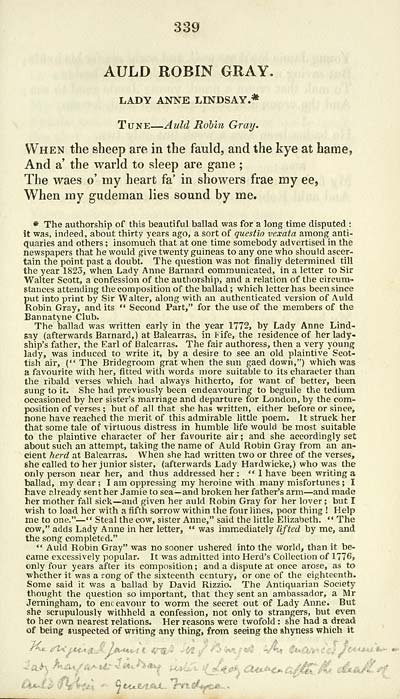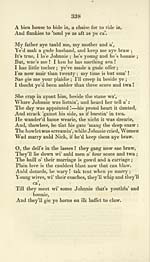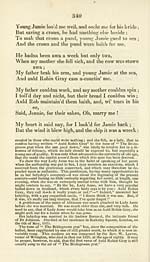Glen Collection of printed music > Printed text > Scottish songs > Volume 2
(39) Page 339 - Auld Robin Gray
Download files
Complete book:
Individual page:
Thumbnail gallery: Grid view | List view

339
AULD ROBIN GRAY.
LADY ANNE LINDSAY.*
Tune — Auld Robin Gray.
When the sheep are in the fauld, and the kye at hame,
And a' the warld to sleep are gane ;
The waes o' my heart fa' in showers frae my ee,
When my gudeman lies sound by me.
» The authorship of this beautiful ballad was for a long time disputed :
it was, indeed, about thirty years ago, a sort of questio vexata among anti-
quaries and others ; insomuch that at one time somebody advertised in the
newspapers that he would give twenty guineas to any one who should ascer-
tain the point past a doubt. The question was not finally determined till
the year 1823, when Lady Anne Barnard communicated, in a letter to Sir
Walter Scott, a confession of the authorship, and a relation of the circum-
stances attending the composition of the ballad ; which letter has been since
put into print by Sir Walter, along with an authenticated version of Auld
Robin Gray, and its " Second Part," for the use of the members of the
Bannatyne Club.
The ballad was written early in the year 1772, by Lady Anne Lind-
say (afterwards Barnard,) at Balcarras, in Fife, the residence of her lady-
ship's father, the Earl of Balcarras. The fair authoress, then a very young
lady, was induced to write it, by a desire to see an old plaintive Scot-
tish air, (" The Bridegroom grat when the sim gaed down,") which was
a favourite with her, fitted with words more suitable to its character than
the ribald verses which had always hitherto, for want of better, been
sung to it. She had previously been endeavouring to beguile the tedium
occasioned by her sister's marriage and departure for London, by the com-
position of verses ; but of all that she has written, either before or since,
none have reached the merit of this admirable little poem. It struck her
that some tale of virtuous distress in humble life would be most suitable
to the plaintive character of her favourite air ; and she accordingly set
about such an attempt, taking the name of Auld Robin Gray from an an-
cient herd at Balcarras. When she had written two or three of the verses,
she called to her junior sister, (afterwards Lady Hardwicke,) who was the
only person near her, and thus addressed her : *• 1 have been writing a
ballad, my dear ; I am oppressing my heroine with many misfortunes ; I
have already sent her Jamie to sea— and broken her father's arm — and made
her mother fall sick — and given her auld Robin Gray for her lover ; but I
wish to load her with a fifth sorrow within the four lines, poor thing ! Help
me to one." — " Steal the cow, sister Anne," said the little Elizabeth. " The
cow," adds Lady Anne in her letter, " was immediately lifted by me, and
the song completed."
" Auld Robin Gray" was no sooner ushered into the world, than it be-
came excessively popular. It was admitted into Herd's Collection of 1776,
only four years after its composition; and a dispute at once arose, as to
■whether it was a cong of the sixteenth century, or one of the eighteenth.
Some said it was a ballad by David Rizzio. The Antiquarian Society
thought the question so important, that they sent an ambassador, a Mr
Jerningham, to enceavour to worm the secret out of Lady Anne. But
she scrupulously withheld a confession, not only to strangers, but even
to her own nearest relations. Her reasons were twofold : she had a dread
of being suspected of writing any thing, from seeing the shyness which it
AULD ROBIN GRAY.
LADY ANNE LINDSAY.*
Tune — Auld Robin Gray.
When the sheep are in the fauld, and the kye at hame,
And a' the warld to sleep are gane ;
The waes o' my heart fa' in showers frae my ee,
When my gudeman lies sound by me.
» The authorship of this beautiful ballad was for a long time disputed :
it was, indeed, about thirty years ago, a sort of questio vexata among anti-
quaries and others ; insomuch that at one time somebody advertised in the
newspapers that he would give twenty guineas to any one who should ascer-
tain the point past a doubt. The question was not finally determined till
the year 1823, when Lady Anne Barnard communicated, in a letter to Sir
Walter Scott, a confession of the authorship, and a relation of the circum-
stances attending the composition of the ballad ; which letter has been since
put into print by Sir Walter, along with an authenticated version of Auld
Robin Gray, and its " Second Part," for the use of the members of the
Bannatyne Club.
The ballad was written early in the year 1772, by Lady Anne Lind-
say (afterwards Barnard,) at Balcarras, in Fife, the residence of her lady-
ship's father, the Earl of Balcarras. The fair authoress, then a very young
lady, was induced to write it, by a desire to see an old plaintive Scot-
tish air, (" The Bridegroom grat when the sim gaed down,") which was
a favourite with her, fitted with words more suitable to its character than
the ribald verses which had always hitherto, for want of better, been
sung to it. She had previously been endeavouring to beguile the tedium
occasioned by her sister's marriage and departure for London, by the com-
position of verses ; but of all that she has written, either before or since,
none have reached the merit of this admirable little poem. It struck her
that some tale of virtuous distress in humble life would be most suitable
to the plaintive character of her favourite air ; and she accordingly set
about such an attempt, taking the name of Auld Robin Gray from an an-
cient herd at Balcarras. When she had written two or three of the verses,
she called to her junior sister, (afterwards Lady Hardwicke,) who was the
only person near her, and thus addressed her : *• 1 have been writing a
ballad, my dear ; I am oppressing my heroine with many misfortunes ; I
have already sent her Jamie to sea— and broken her father's arm — and made
her mother fall sick — and given her auld Robin Gray for her lover ; but I
wish to load her with a fifth sorrow within the four lines, poor thing ! Help
me to one." — " Steal the cow, sister Anne," said the little Elizabeth. " The
cow," adds Lady Anne in her letter, " was immediately lifted by me, and
the song completed."
" Auld Robin Gray" was no sooner ushered into the world, than it be-
came excessively popular. It was admitted into Herd's Collection of 1776,
only four years after its composition; and a dispute at once arose, as to
■whether it was a cong of the sixteenth century, or one of the eighteenth.
Some said it was a ballad by David Rizzio. The Antiquarian Society
thought the question so important, that they sent an ambassador, a Mr
Jerningham, to enceavour to worm the secret out of Lady Anne. But
she scrupulously withheld a confession, not only to strangers, but even
to her own nearest relations. Her reasons were twofold : she had a dread
of being suspected of writing any thing, from seeing the shyness which it
Set display mode to: Large image | Transcription
Images and transcriptions on this page, including medium image downloads, may be used under the Creative Commons Attribution 4.0 International Licence unless otherwise stated. ![]()
| Special collections of printed music > Glen Collection of printed music > Printed text > Scottish songs > Volume 2 > (39) Page 339 - Auld Robin Gray |
|---|
| Permanent URL | https://digital.nls.uk/90426404 |
|---|
| Shelfmark | Glen.105a |
|---|---|
| Additional NLS resources: | |
| Attribution and copyright: |
|
| Description | Scottish songs and music of the 18th and early 19th centuries, including music for the Highland bagpipe. These are selected items from the collection of John Glen (1833 to 1904). Also includes a few manuscripts, some treatises, and other books on the subject. |
|---|
| Description | The Glen Collection and the Inglis Collection represent mainly 18th and 19th century Scottish music, including Scottish songs. The collections of Berlioz and Verdi collected by bibliographer Cecil Hopkinson contain contemporary and later editions of the works of the two composers Berlioz and Verdi. |
|---|

